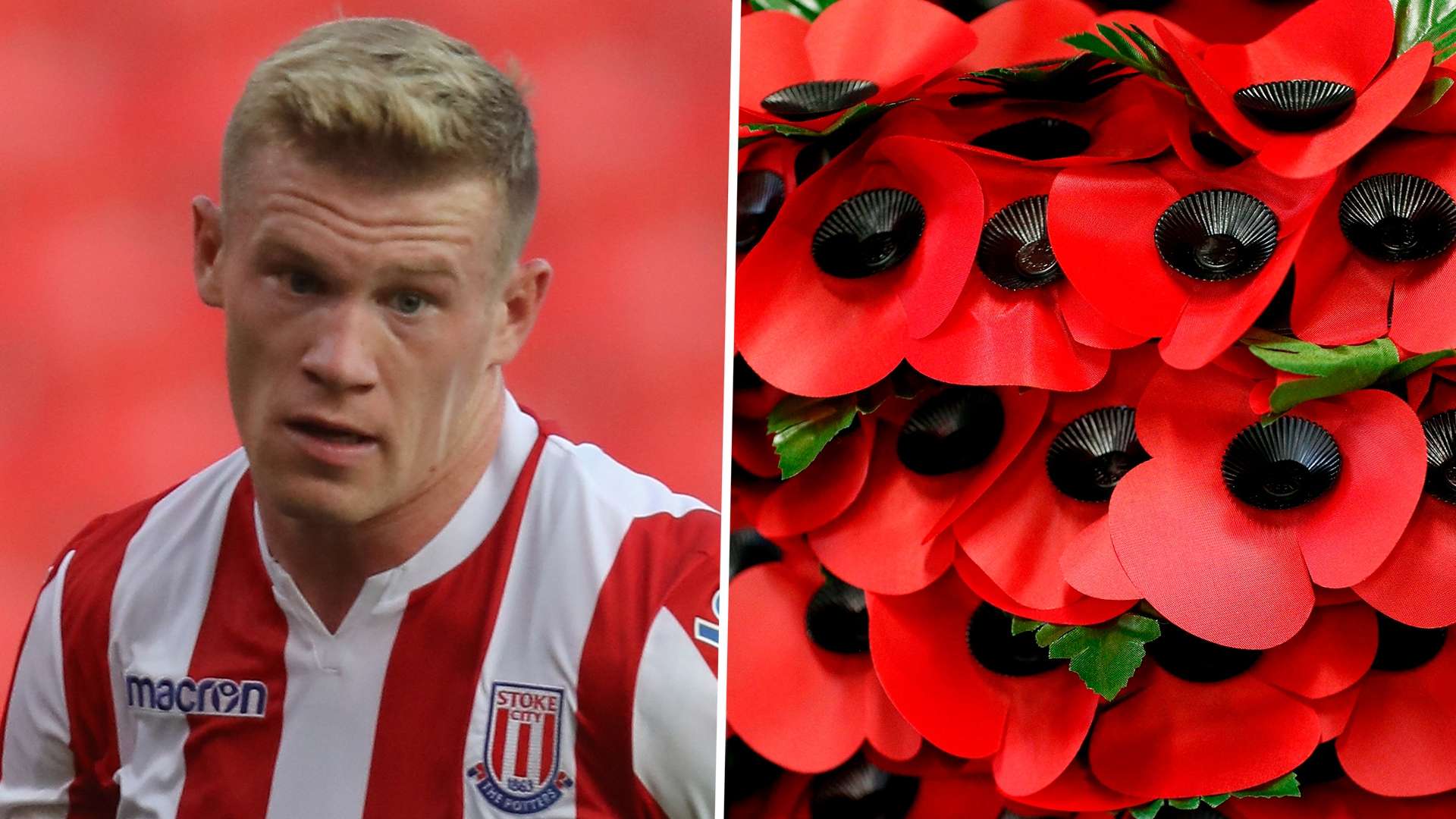Quoting Provisional IRA hunger striker Bobby Sands in his reply was never going to earn James McClean any further degree of understanding from those fans who had criticised his decision to play for Stoke City without the Royal British Legion’s poppy pressed onto his shirt.
The McClean – poppy furore comes up again and again without fail but this year it appears to be particularly hateful. On Saturday evening after Stoke had played against Middlesbrough, video footage was shared of the Ireland midfielder receiving vicious, bile-filled abuse from the away support at the Bet365 stadium.
McClean’s message over the weekend on Instagram, meanwhile, made mention of a “section of uneducated cavemen” in the ground’s Boothen End among other things.
The FA’s decision to investigate the comments in which he also described those fans as “c**ts” is going to make him a target for further abuse. But, at the end of the day, McClean is a free man in a free country and so is entitled to say whatever he likes.
“They have nothing in their whole imperial arsenal that can break the spirit of one Irishman who doesn’t want to be broken,” he said using the words of Sands, who died aged 27 in 1981.
Up to then, McClean had respectfully, and with dignity, opted against playing with the emblem on his chest. He spelled out those reasons in a letter to the Wigan Athletic chairman Dave Whelan in 2014.
McClean opposes the historical actions of the British Army in his native Derry and is entitled to express that opinion. McClean has repeatedly stated in the past that he would indeed wear the poppy if it were only to commemorate the soldiers who gave their lives in the First and Second World Wars. But the Royal British Legion website shows that is simply not the case.
“The Legion works to ensure that the people of the United Kingdom remember all those who have lost their lives on active service to the Crown and honours the service of the Armed Forces and veterans, and the contribution of their families – our beneficiary community,” one statement reads.

“Wearing a poppy is a way of showing public appreciation for the service and sacrifice of the Armed Forces, veterans and their families in safeguarding our freedoms and values,” goes another.
“The Legion advocates a specific type of Remembrance connected to the British Armed Forces, those who were killed, those who fought with them and alongside them,” it says concerning the period up to Remembrance Sunday.
“The Troubles” are specifically mentioned by the Legion in this context, alongside the Mau Mau Uprising in Kenya which ended with more than 20,000 deaths, the Falklands War, the First and Second Gulf Wars, the War in Afghanistan as well as the Balkan Wars of the 1990s.
It's not always easy to stomach it, but there are entire populations out here who do not necessarily think of the Dambusters when they hear the words "British Army". For many, there are wars written in the annals of history in which they are the bad guys. That might not be a reflection of the Britain that McClean currently makes his living in but it is a point of perspective.
The British Army was called to Northern Ireland in August 1969 to deal with riots that had sprung up in McClean’s hometown of Derry, Belfast and elsewhere. That was the beginning of Operation Banner, which lasted officially until 2007.
And the poppy – with its connotations of British militarism in Northern Ireland – has predominantly been used there by Unionist communities, i.e those on one side of the conflict.
That’s the problem with the poppy; it separates people into “us” and “them” where the two sides are irrevocably divided. That’s not James McClean’s fault, it’s neither the fault of those who abuse him. It’s a matter of historical interpretation.
Republicans simply cannot countenance a symbol which they believe stands for collusion, assassination, murder and the arming of loyalist terror groups. James McClean counts himself part of that community.
There are indeed those who wear the poppy to remember the fallen of 1914-1918 and 1939-1945 just as there are those who wear it to remember those currently active and former members of the British Army. And there are those who don’t wear them at all.
Indeed, in the street it is that number which vastly outweighs the other. But you wouldn’t think it when you look at the television. Everyone is wearing a poppy, barring a few notable exceptions. At this time of year, it is a point of controversy as viewers quite literally make notes of who’s got one on and who hasn’t. That’s not fair.
What used to be a private and voluntary point of reflection has become a strictly-policed display of patriotism. Woe betide those who don’t stand in line.
Besides, teams in English football only began to wear the poppy in 2010. It’s a recent trend but one that has grown abundantly. It brings another question; namely, why should the game of football be now endorsing the actions of the military when for much of the century before it had not?
If English football did not use poppies in the weeks leading up to Remembrance Sunday – as has been the case down throughout history – then McClean would not be subjected to the abuse. If it were indeed a case of players wearing them voluntarily, it would be interesting to see just how many would do so.
Great Britain is indeed a free and tolerant country, until someone like James McClean does something to test its freedoms and tolerance.


